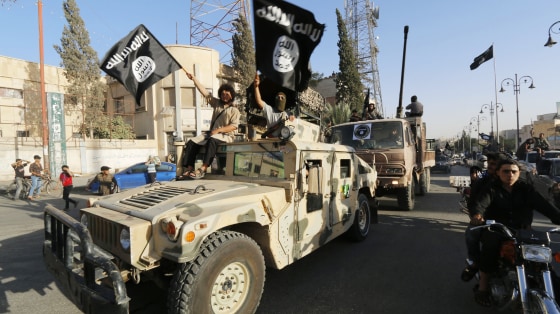

The Islamic State, or ISIS, is a militant organization that emerged as an offshoot of al Qaeda in 2014. It quickly took control of large parts of Iraq and Syria, raising its black flag in victory and declaring the creation of a caliphate and imposing strict Islamic rule.
The group is sometimes also referred to as ISIL — for the Islamic State of Iraq and the Levant — or by its Arabic acronym, Daesh.
It is largely made up of Sunni militants from Iraq and Syria but has also drawn thousands of fighters from across the Muslim world and Europe.
Its tactics — including beheadings, the taking of slaves and bans on “un-Islamic” behavior such as music and smoking — are so brutal that it was even disowned by al Qaeda.
The militants' goal is an ultra-conservative caliphate that strictly enforces Shariah, or Islamic, law.
ISIS was founded by Abu Bakr al-Baghdadi, an Iraqi.
He first led al Qaeda in Iraq, transforming it into an effective and organized fighting force. The group changed its name in April 2013, signaling its broader ambition of establishing a caliphate extending across Iraq and Syria.
In June 2014, ISIS published a manifesto purporting to trace al-Baghdadi's lineage directly back to the Prophet Muhammad.
Russia believes one of its airstrikes may have killed al-Baghdadi in May 2017. However, that has never been confirmed.
The group’s director of external operations, Abu Muhammad al-Adnani, is on the FBI’s Most Wanted List as the man most likely to cause harm in the West.
Counterterrorism officials have said that al-Adnani most likely "greenlighted" the deadly Paris terrorist attacks in November 2015 that killed 130.
ISIS doesn’t recruit women for battlefield roles, but it still has enlisted women from around the Muslim world and Europe to help build its caliphate.
The group uses social media to get the word out, promising women husbands who are devout jihadis.
In its one-time capital, Raqqa, a female brigade enforced their strict interpretation of Shariah by ensuring that women dressed according to their standards of modesty and by punishing them with lashes if they violated the code.
Since 2014, the U.S. has led a coalition of countries carrying out airstrikes against ISIS and in support of Iraqi troops fighting the militants.
By the end of 2017, ISIS lost much of its ground in Iraq and Syria, and Iraq declared its war against the militant group over in December.
However, while ISIS' self-declared caliphate is in territorial tatters, analysts have warned that the group is retreating into what some call a “virtual caliphate" from where it will attempt to inspire more lone wolf terror attacks in the West.